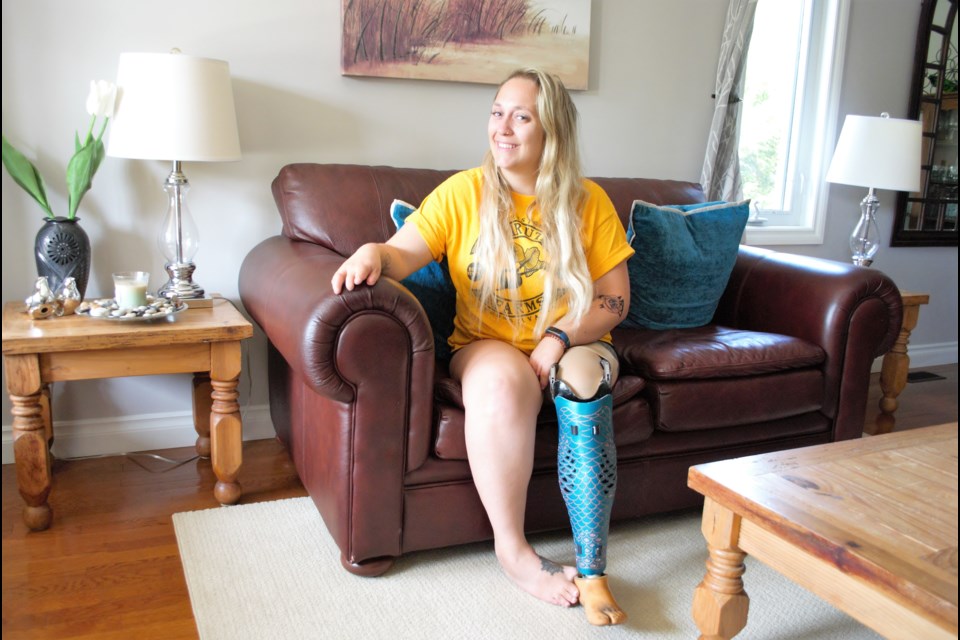When Sarah Anne Cormier is at the top of a snowy mountain, she feels happy.
The 28-year-old Jean Vanier alumni is counting her blessings since being added to the roster of the Team Canada NextGen Parasnowboarding team two months ago, and is gearing up for her first round of international competitions this fall.
“It’s just nice being up on the mountain in the fresh air with beautiful views all around. I’m doing something I love, and I get to do it every day,” she said. “When I’m competing, it’s a total daredevil adrenaline rush.”
“Even if I don’t win, I just feel exhilarated at the end of it,” she added.
Cormier was born with amniotic band syndrome, which occurs when bands of amnion (the inner lining of the amniotic sack) peel away from the sack in the womb and wrap around parts of a baby's body, disrupting normal development.
Due to the abnormality, her hands never fully developed and she was born without her left leg.
Growing up in Collingwood, Cormier says living with her disability wasn’t a big deal, although she remembers being bullied as a child.
“Up until about Grade 10, I had a lot of issues with bullying. There was a switch once everyone matured a bit more. I found my teachers were always incredibly supportive and the group of friends I had here and my parents,” she said.
At a young age, Cormier’s parents enrolled her in the Ontario Track 3 program, a volunteer-based charity enabling kids and youth with disabilities through snow sports.
As her parents are avid skiiers, Cormier said she started with skiing, but found herself frustrated when people would stare at her due to the equipment required.
“When you’re six or seven years old, it’s not something you want. I wanted to try snowboarding, but Track 3 didn’t offer it then. So, Blue Mountain Resort did it through private lessons,” she said. “I loved it way more than skiing, so I made the switch.”
Cormier snowboarded recreationally for years. It wasn’t until she was approached recently that she considered taking up the sport to compete at the international level.
“When I was young, my mom had suggested I could become a pro and compete in the Paralympics. At the time, I told her not to be ridiculous,” said Cormier with a laugh. “I thought it wasn’t something that was in the realm of possibility for me.”
“I had gone to a Paralympic search about a year and a half ago for running, because I really love running. When I was there, they asked if I did any other sports. I told them I’d been snowboarding for 16 years,” she said.
Initially, Cormier felt trepidation about competing.
“I love snowboarding so much, and I didn’t want it to be ruined by (doing it at) a competitive level,” she said. “I had that fear, and I really didn’t think I was very good.”
Cormier gave it a try and started attending a development camp in Collingwood with professional coaches.
“My coach said I did have 16 years of bad habits, but if I was willing to put the work in, that I could make it,” she said. “That was a bit of a switch, and that was exciting.”
Cormier said even she was astounded by how much her skill level progressed as she trained over time. She was shocked, when during training in Whistler B.C. two months ago, it was announced she was accepted onto the NextGen team, which feeds into the national team.
There are eight team members that comprise the entire national team; four make up NextGen. Cormier is one of two team members from Ontario.
“There’s only three women on the team, too,” she said.
Cormier said she’s working hard on her training. Her first competition is slated for November in the Netherlands, with other competitions planned for this season in Dubai and the Yukon. Cormier is currently living in Kingston and works there as a registered nurse.
“I spent the last eight years in university, so I have a lot of loans to pay off. I’m trying to balance it right now, doing the snowboarding and working. I’m only part time, and I can’t work full time while I’m on Team Canada,” she said.
Some money is put forward by the government to pay expenses, but athletes are still expected to shoulder some of the costs associated with competing.
“Canada Snowboard does help out with some of it. For example, for Dubai, all I’m paying for is my flight. They’re paying for accommodations and expenses,” she said. “It’s still pricey.”
If you’d like to contribute to Cormier’s expenses, visit her GoFundMe page here.



